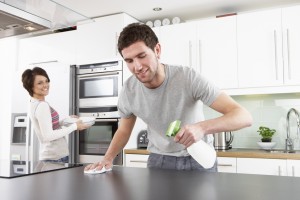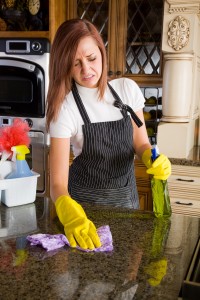
Countertops
Cleaning your countertop requires much more than wiping it down with a damp cloth. Countertops can be made from a variety of materials, such as wood, granite, stainless steel, Formica, etc., and so with every countertop comes a cleaning method that is as unique as its surface. So, if you’re thinking of sprucing up your countertop, be sure to do your research as to what methods are appropriate for your countertop’s particular material before you start to clean.
How To

Granite
- If your countertop is made of granite, the biggest thing to avoid when cleaning is any solution that is acidic-based. It’s best to use a simple solution of soap and warm water along with a damp cloth to wipe it down. Beware: granite is highly permeable, so if your countertop wasn’t given a proper sealant, an improper cleaning solution could damage the granite. Specialized, effective, cleaning products for granite are available, such as Miracle’s Counter Kleen Spray Cleaner. Counter Kleen is specially-formulated to get rid of stains dirt and dust off of polished granite countertops.
Wood
- If you have a wood countertop, the best cleaning method is to use a solution of baking soda and water (half-cup of baking soda to a quart of warm water). Apply the solution using a scouring pad, and then wipe down the surface thoroughly. Let dry, and then apply mineral oil to the wood using a pad of steel wool. Wait one day and then repeat the oil application. Also, wood surfaces can get tricky to clean due to the potential for staining and lingering odors. To get rid of any stain, simply mix one-quarter of bleach with one quart of warm water, saturate the countertop with the solution, wipe it down, let dry, and then apply mineral oil onto the wood surface. If you happen to have odors in your wood, simply wipe down the surface with a lemon slice.
Stainless Steel
- For stainless steel countertops—with their reputation for being tough to maintain that sheen and sparkle—the best method for cleaning is to use warm water and baking soda. Also, should you spy any mineral stains on the surface, vinegar followed by a water rinse should do the trick. Avoid steel wool pads, scouring pads, etc. which will ruin the sheen. A further tip: avoid leaving damp objects on the steel surface—over time the dampness will discolor the steel.
Formica
- For a Formica countertop, its low-cost, low-maintenance value make it an attractive option. Formica is easy to clean—a cloth, soap, and warm water is all you need. But beware: Formica can stain easily, and can also streak over the surface. If streaking is an issue, clean the surface using a glass cleaner, such as GreenShield. USDA Certified, GreenShield is an organic cleaner, ammonia-free, and child and pet safe.
Silestone
- Silestone—a strong, organic material from the quartz family—can be cleaned using a soft sponge or cloth and any household cleaner. But be sure to stay away from the more harsh cleaners. If you encounter any stains on your silestone surface, briefly douse the stain with water, and then apply a soft cloth to gently remove the stain off the surface.
Ceramic
- For a ceramic tile countertop, your main concern is the grouting in between the tiling—which is most susceptible to wear and tear. So to effectively clean these areas, dip a toothbrush in some bleach and scrub the grouting. Also, there are specific grout cleaners on the market that you can use, such as Dupont’s Heavy Duty Grout Cleaner. It is professional strength, safe on tile, and inexpensive. Remember, no matter how you clean your grouting, always wear rubber gloves and wash the excess away with water.

Acrylic
- It takes a lot to damage an Acrylic countertop, so, if you have one, the easiest way to get rid of a stain or a scratch, is by using a pad of steel wool and some scouring powder. However, for general up-keep of your acrylic surface, wet the surface with water and then clean the surface with a moderately-harsh cleaner. Then rinse off the surface and dry with a cloth.
Marble
- Marble countertops have a reputation as being prone to stains, so be sure to clean any spills as soon as possible, avoiding harsh cleaners, opting instead for a cleaner such as Borax. After you’ve cleaned the surface, simply clean with warm water wipe dry with a cloth.
Laminate
- With laminate countertops prone to being easily scratched and stained, occasionally applying a spray coat of furniture wax to the surface will aid in long-term protection of the laminate. Avoid harsh chemical cleaners and steel wool. Also, to clean grease or hardened food stains, use warm water and a fibrous sponge.
Tips & Takeaways
Proper care of your countertops is crucial if you want them to look new for years to come. Make sure that you are not wiping your countertop off with the same damp rag in between cleanings because this can actually spread germs and bacteria. This bacteria can be from raw food products and dirt which can be harmful to your health. Using disinfectant wipes on a regular basis will help to limit the amount of germs and bacteria on your counter resulting in a more hygienic workspace.